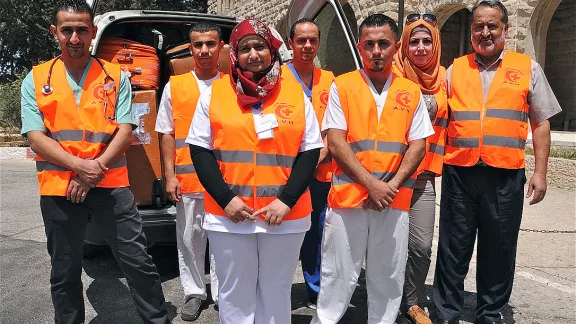
Augusta Victoria Hospital staff before entering Gaza at the time of the 2014 conflict. The LWF Council has condemned the continued violence in the region. Photo: LWF Jerusalem
LWF Council concern over violence against religious minorities
GENEVA, 3 August 2015 (LWI) - At its 2015 meeting, the Council of The Lutheran World Federation (LWF) adopted a resolution on the Middle East, voicing concern about violence in the region, the vulnerability of religious and other minorities, and the breakdown of the Israeli-Palestinian peace process.
“Religion has been used to legitimize much of the region’s violence,” the resolution states, citing the situation in Syria, Iraq and the unresolved Israeli-Palestinian conflict. "Religious groups have been targeted. In this context, efforts to promote religiously-identified political moderation are struggling against the growth of extremism.
“The region needs justice not more arms,” the resolution says.
Millions of displaced and refugees
It also mentions the millions of displaced people who have sought refuge in Jordan, Turkey and other countries. “These host countries cannot keep up this level of welcome indefinitely,” the resolution states.
LWF is assisting people who have been affected by all of these conflicts. In northern Iraq, LWF is assisting internally displaced people from the Sinjar area who are now living in refugee camps and host communities in Dohuk, as well as in churches in the Jordanian capital Amman.
In Jordan, LWF is supporting refugees from Syria in Za’atari refugee camp and in neighboring host communities. More than 80,000 people, many of them children, have been forced into this protracted refugee situation. As the war in Syria enters its fifth year, their future is uncertain.
The resolution also mentions the Israeli-Palestinian conflict, unresolved for 67 years. “In the latest Gaza war last year, more than 2,000 people were killed, the vast majority of whom were Palestinian civilians; 490 of these civilians were children,” the resolution reads.
Extreme needs
When violence erupted in Gaza in August 2014, the LWF-run Augusta Victoria Hospital sent two volunteer medical teams totaling six doctors and six nurses to Gaza to care for the increasing number of people injured in the ongoing conflict with Israel. The AVH team included specialists in emergency medicine, intensive care, surgery, internal medicine and pediatrics, with accompanying specialty nursing. The team also brought in much-needed medical supplies and medicines. Five hospitals and 34 clinics had been shut down in Gaza due to the insecure situation.
The medical team told harrowing stories about the situation in Gaza during the shelling. “There are people sleeping all around us in the hospital, on the floors, in the corridors, homeless, hopeless, with no families. Volunteers in the hospital do nothing but mop spilt blood covering the floors. The smell of blood is the only odour,” one nurse wrote.
Churches asked to advocate
The AVH also set up a department with 12 additional surgical beds and four intensive care beds to serve injured casualties and cancer patients trapped in Gaza.
In its resolution, the LWF Council urges the international community to “resolve the region’s conflicts through negotiation rather than further violence.” It calls upon member churches to “advocate with their governments to ensure constructive engagement and to address the causes of human suffering rather than addressing their effects only.”
Read the Council resolution on the Middle East


